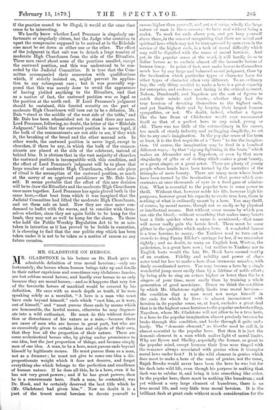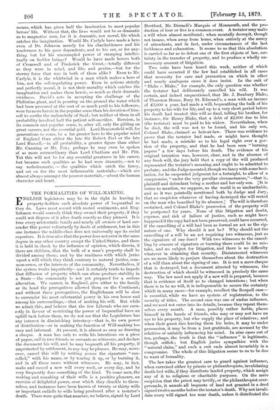MR. GLADSTONE ON HEROES.
Apt. GLADSTONE in his lecture on Dr. Hook gave an admirable definition of true moral heroism ;—only un- fortunately, the heroes whom human beings take up and fondle in their rather capricious and sometimes very idolatrous fancies, are but seldom moral heroes, and hardly ever heroes to us only because they are moral heroes,--and so it happens that very few of the favourite heroes of mankind would be covered by his definition. He says with as much depth as truth, if he were speaking solely as a moralist, " A hero is a man who must have ends beyond himself," ends which "cast him, as it were, out of himself," and " must pursue these ends by means which are honourable, the lawful means, otherwise he may degener- ate into a wild enthusiast. He must do this without distor- tion or disturbance of his nature as a man,—because there are cases of men who are heroes in great part, but who are so excessively given to certain ideas and objects of their own, that they lose all the proportion of their nature. There are some ecclesiastical heroes who, by giving undue prominence to one idea, lost the just proportion of things, and became simply men of one idea. A man, to be a hero, must pursue ends beyond himself by legitimate means. He must pursue them as a man, not as a dreamer ; he must not give to some one idea a dis- proportionate weight which it does not deserve, and forget everything else which belongs to the perfection and excellence of human nature. If he does all this, he is a hero, even if he has not very great powers ; and if he has great powers, then he is a consummate hero. Such a man, he contended, was Dr. Hook, and he certainly deserved the best title which he (Mr. Gladstone) had given him." . Now no doubt it is a part of the truest moral heroism to devote yourself to
causes higher than yourself, and yet not merge wholly the large nature of man in these causes ;—to have zeal without being a zealot. To work for ends above you, and yet keep yourself above them, in the sense of recognising that there are moral and spiritual laws which may not be transgressed by men even in the service of the highest ends, is a task of moral difficulty which may well be dignified with the name of moral heroism. And yet, in the popular sense of the word, it will hardly do so to define heroes as to exclude almost all the favourite heroes of human fancy. In point of fact, men make heroes to themselves much less by any large and balanced moral judgment, than by the fascination which particular types of character have for other types of character often very different. To an ordinary boy, the only thing needful to make a hero is a great capacity for enterprise, and coolness and daring in the critical moment. Nelson, Dundonald, and Napoleon are the sort of figures to catch their minds and hearts,— whether they had the true heroism of devoting themselves to the highest ends, and yet limiting their zeal by keeping their largest human sympathies, or not. We doubt, indeed, whether a figure like the late Dean of Chichester would ever recommend itself as that of a perfect hero to any mind, young or old. There was too little of the extraordinary in his career, too much of steady industry and unflagging simplicity, to set fire to any one's imagination. In the popular sense of the term at least, it is the first requisite of a " hero " to fire the imagina- tion. Of course, the imagination may be fired in a hundred different ways,—by that " zig-zag lightning in the brain " which makes an Alexander and a Napoleon, or even by that mere singularity of gifts or of destiny which makes a great beauty, or a great singer, or a great actor. There are plenty of young people whose heads have been turned by the narrative of the triumphs of mere beauty. There are many more whose heads have been turned by the fascination of that power which con- centrates at once thousands of eyes in a fixed gaze of admira- tion. What is essential to the popular hero is some power to thrill. Without that, however noble his life, however high his purposes, however great his capacity to excite true love, there is nothing of what is ordinarily meant by a hero. You may thrill, of course, by moral means, though not so easily as by physical or intellectual means. But without some means by which you can stir the blood,—without something that makes many hearts beat a little quicker when a name is mentioned,—that name will never really gain the heroic level. There must be some glitter in the qualities which make a hero. A wonderful dancer is a true heroine, to many,—the Yankees used to turn out in crowds to drag Fanny Ellsler's carriage for her, if we remember rightly ; and no doubt, to many an English lout, Weston, the pedestrian, is a great hero now ; but neither to Yankees nor to English louts would the late Dr. Hook have seemed worthy of an ovation. Fidelity and nobility and power of char- acter tend far less to make a hero than strenuous muscles, with finely co-ordinated nerves. You may become a hero by a single wonderful jump more easily than by a lifetime of noble effort ; by being able to sing an octave higher or lower than the best singers of your time, more easily than by training a whole generation of good musicians. Hence we think the condition by which Mr. Gladstone rightly limits true moral heroism— the condition that a man must not merge himself in the ends for which he lives—is almost inconsistent with heroism in its popular sense, or, at least, excludes a great deal that is in the highest sense heroism to the popular understanding. Napoleon, whom Mr. Gladstone will not allow to be a true hero, is a hero to the popular imagination almost precisely because he broke through this condition, and broke through it quite reck- lessly. The " demonic element," as Goethe used to call it, is almost essential to the popular hero. But then it is just the demonic element in a man which makes light of moral limits. Why are Byron and Shelley, especially the former, so great to the popular mind, except because their lives were tinged with the romance always associated with genius when it tramples moral laws under foot P It is the wild element in genius which does most to make a hero of the man of genius, not the tame, Rajah Brooke would never have been the hero he was but for his dash into wild life, even though his purpose in making that clash was to subdue it, and bring it into something like order. In the popular hero, there must be nothing like humdrum ; and yet without a very large element of humdrum, there is no true moral life, and very little true moral heroism. It is the brilliant dash at great ends without much consideration for the means, which has given half the fascination to most popular heroes' life. Without that, the lives would not be so dramatic as to magnetise men, for it is dramatic, not moral, life which catches the imagination. Would Mr. Carlyle have made a hero even of Dr. Johnson merely for his charitableness and his tenderness to his poor dependents, and to his cat, or for any- thing but for his unexampled power of stamping intellec- tually on feebler beings? Would he have made heroes both of Cromwell and of Frederick the Great,—totally different as they were in mind, and life, and genius,—but for the stormy force that was in both of them alike P Even to Mr. Carlyle, it is the whirlwind in a man which makes a hero of him, not the self-regulating power. Even in actions strictly and perfectly moral, it is not their morality which catches the imagination and makes them heroic, so much as their dramatic vividness. David's acts in accepting the challenge of the Philistine giant, and in pouring on the ground the water which had been procured at the cost of so much peril to his followers, were far more heroic in the popular sense than his devotion of him- self to soothe the melancholy of Saul ; but neither of them in all probability involved half the patient self-sacrifice. Heroism, in its common and popular sense, is, after all, only the gilding on great careers, not the essential gold. Lord Beaconsfield will, for generations to come, be a far greater hero to the popular mind of England than either the late Sir Robert Peel or the late Lord Russell,—in all probability, a greater figure than either Mr. Canning or Mr. Fox ; perhaps he may even be spoken of as more extraordinary than Lord Chatham and Mr. Pitt. Yet this will not be for any essential greatness in his career, but because such qualities as he had were dramatic,—not to say melodramatic, — the qualities which catch the fancy, and set on fire the most inflammable materials,—which are almost always amongst the poorest materials,—about the human character and heart.



































 Previous page
Previous page